Sunday, January 30, 2011
美国最高法院全面保守化了么
后记:匆匆与生活讲和,岂非负了少年
在政治与法律之间
Wednesday, January 26, 2011
Winston Chung Commits to a $10 Million Gift to UC Riverside
Prominent Chinese businessman announces his commitment to provide an endowment supporting UC Riverside’s Bourns College of Engineering
(January 24, 2011)
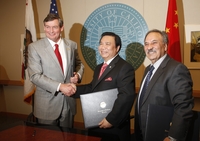 Enlarge
EnlargeAfter signing a memorandum of understanding that will lead to a $10 million gift to UC Riverside, Chinese inventor and businessman Winston Chung and UC Riverside Chancellor Timothy P. White shake hands as Reza Abbaschian, dean of the Bourns College of Engineering, looks on. Photo credit: Peter Phun
Chung and UC Riverside Chancellor Timothy P. White on Monday signed a memorandum of understanding that will lead to the gift, which will make Chung the largest individual donor to the campus in UC Riverside history.
Chung is the founder of Winston Global Energy Limited and inventor of the rare earth lithium yttrium battery.
“The University of California, Riverside welcomes Mr. Winston Chung as an integral partner in our educational and research mission,” White said. “His investment in this university will result in generations of students and faculty sharing their knowledge with local and global communities, and in new materials and new energy sources for an energy-hungry world. This gift is a wonderful testimony to the current strengths and aspirational future of the UCR Bourns College of Engineering.”
Reza Abbaschian, dean of the Bourns College of Engineering, said Chung’s work on electric vehicles is a perfect match with the Bourns College of Engineering-Center for Environmental Research & Technology (CE-CERT) and the Southern California Research Initiative for Solar Energy (SC-RISE) at UC Riverside.
“Mr. Chung has created a clean and efficient energy storage that is an expression of a sustainable future,” Abbaschian said. “We are talking about vehicles that go for 180 miles on a single charge and can be recharged in the time it takes to stop and drink a cup of coffee.” He said he is excited by the prospect of future research collaborations, and by the opportunities the gift would mean for engineering students.
When an endowed fund is created in Chung’s name, UC Riverside will:
• Name the building currently known as Engineering Building II as Winston Chung Hall.
• Support two named professorships in the Bourns College of Engineering: the Winston Chung Professorship in Energy Innovation and the Winston Chung Professorship in Sustainability.
• Establish the Winston Chung Global Energy Center within CE-CERT. The center will initially focus on Life Source Rare Earth Lithium batteries, which Chung invented, bio-inspired technology and the development of clean energy and energy storage.
Since arriving in the United States, Winston Global Energy Ltd. announced it will provide $310 million to MVP RV, which is based in Riverside, to promote motorhome exports to China. Additional money will fund development of all-electric RVs and fast-charging electrical systems.
The deal was one of about 70 between the U.S. and China announced in connection with the official state visit by Chinese President Hu Jintao, in what was called a demonstration of cooperation between the two countries.
MVP RV expects to export more than 30,000 motorhomes, valued at approximately $5 billion, to China over the next three to four years. The joint venture will push the number jobs at MVP RV from 130 to more than 1,400.
In November, Balqon Corporation, a California developer and manufacturer of zero-emission heavy-duty electric vehicles and drive systems, and Winston Battery jointly showcased their drive systems and battery technologies at The World Electric Vehicle Symposium and Exposition in China. The companies demonstrated the world’s first all-electric recreational vehicle, with a range of 200 km on a single charge. The 45-foot RV can be fully charged within 20 minutes, as compared to 8 hours using traditional methods.
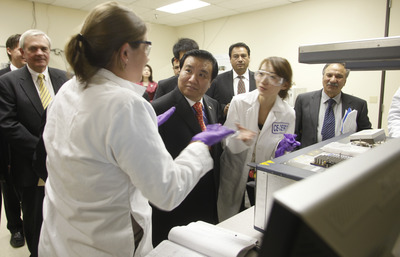 Enlarge
EnlargeChinese inventor and businessman Winston Chung at a lab in the College of Engineering-Center for Environmental Research and Technology.
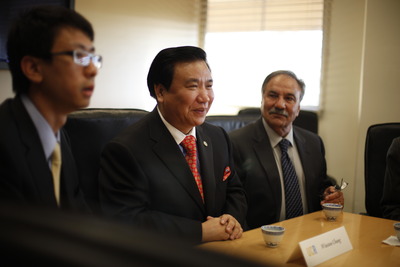 Enlarge
EnlargeChinese inventor and businessman Winston Chung with Reza Abbaschian, dean of the Bourns College of Engineering, looking on.
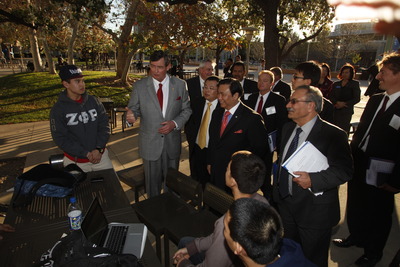 Enlarge
EnlargeUC Riverside Chancellor Timothy B. White and Chinese inventor and businessman Winston Chung talk with students on campus.
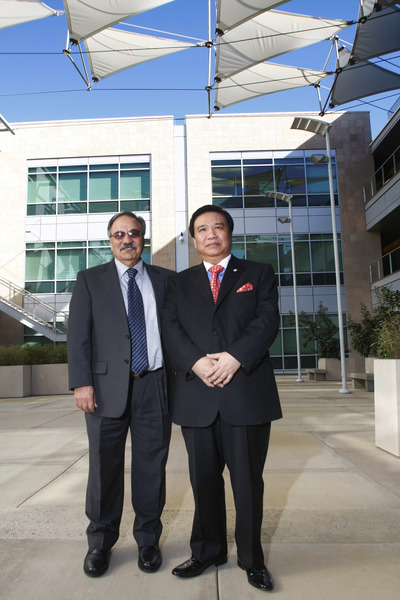 Enlarge
EnlargeReza Abbaschian, dean of the Bourns College of Engineering, left, and Chinese inventor and businessman Winston Chung, stand in front of Engineering Building II, which will be renamed Winston Chung Hall.
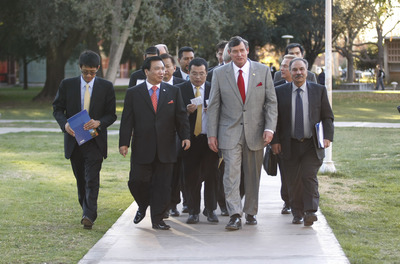 Enlarge
EnlargeUC Riverside Chancellor Timothy B. White and Chinese inventor and businessman Winston Chung lead a group walking across campus.
Monday, January 24, 2011
Saturday, January 22, 2011
Happiness
Thursday, January 20, 2011
US Envoy In Beijing Charms And Unsettles
WSJ 1/19/2011
Summoned for a diplomatic dressing down last year, Jon Huntsman Jr., the U.S. ambassador to Beijing, hopped on his sturdy 'Forever' brand Chinese bicycle and pedaled off to the Foreign Ministry.
Flustered guards there, expecting the U.S. representative to sweep up in an armored Cadillac made him park by a side gate and walk in.
The unceremonious arrival--at once suggesting humility and defiance--was typical of Mr. Huntsman, a Mandarin-speaking former Mormon missionary and the son of a billionaire who has set himself the ambitious goal of 'humanizing' the world's most important bilateral relationship.
Since taking over one of America's top ambassadorial posts in 2009, the former Utah governor and possible Republican presidential candidate has made a habit of challenging diplomatic protocol to both charm and unsettle his hosts.
Over the last year, the father of seven children who used to drive a Harley Davidson around Salt Lake City has, in fact, turned up on his bicycle to receive several official reprimands over issues including U.S. arms sales to Taiwan.
His unusual approach encapsulates the increasingly symbiotic, yet conflicted relationship between the world's dominant power and its emerging Asian rival, one that will be on display when Chinese President Hu Jintao visits Washington this week for the first state visit since 1997.
Huntsman has given key advice to both sides on how to sell the relationship to their respective domestic audiences ahead of the trip and will be on hand for Hu's full itinerary to help choreograph the visit and ensure its success.
'If I were to summarize kind of what everyone's trying to do I think it's to humanize the U.S.-China relationship, to put it in terms that people on both sides really understand,' Huntsman, 50 years old, said in an interview late last week.
'If you can't humanize the relationship, and prove that it's of value to the average citizen, then they're not going to support it, in which case it's of limited value.'
That message rings as true for Beijing as it does for Washington as they try to define their respective roles in the world following a global financial crisis in 2008 that amplified China's emergence as a world power.
The diplomatic certainties that once anchored relations between the two countries have long disappeared. During the Cold War, they found common cause in opposition to the Soviet Union. When China embraced capitalism in the late 1970s, American businesses rushed in to profit from a vast new market for their goods and services. Now, following a series of public disputes last year, China and the U.S. are struggling to define a common agenda that spans the full range of their political, military and economic interests.
'This is a historic visit in the sense that it's the first time ever that both the United States and China have been on the world stage together and they're trying to figure out how to cooperate,' Huntsman said.
'We've met before but never with the glare of the spotlight quite like it is today and the expectations being as high as they are.'
Huntsman was an unconventional choice for the Beijing job: Previous presidents have mostly chosen loyal political supporters with a strong security or business pedigree. Only one was a former elected official, James Sasser, who served in Beijing from 1996 to 1999, and he was at the end of his political career.
When President Barack Obama asked Huntsman to take the post in May 2009, the move was hailed by some Washington pundits as a way to neutralize a potential rival in the 2012 presidential elections.
If that was indeed the idea, its success is not yet guaranteed--Huntsman agreed to do the job only for two years, and hasn't ruled out running in 2012.
He's unusually qualified to represent the U.S. in China following a career that has also included stints as ambassador to Singapore, deputy assistant commerce secretary, deputy trade representative, and an executive in the family plastics business, Huntsman Corp.
Unlike his predecessors, he has a rare combination of political, linguistic and commercial skills. And perhaps more than any other public figure--American or Chinese--his life encompasses the span of modern China-U.S. relations.
In 1971, as an 11-year-old, Huntsman accompanied his father, a plastics tycoon and special assistant to President Richard Nixon, to the White House and met Henry Kissinger just as he was heading to the airport on a secret mission to open diplomatic contacts with China.
Huntsman recalls being allowed to carry Kissinger's briefcase to a waiting car.
After dropping out of high school in the 1970s to play keyboard in a rock band, Huntsman spent two years living as a Mormon missionary and learning Mandarin in Taiwan, the island that Beijing regards as a rebel province. He later resumed his studies and gained a degree in international politics from the University of Pennsylvania.
He first went to Beijing in 1984 when, as a White House aide, he accompanied Ronald Reagan in a meeting with Deng Xiaoping, China's former leader.
As a trade official and as Utah governor, he visited China several times and learned the art of negotiating with Chinese officials. He and his wife also adopted a Chinese girl who was abandoned in a vegetable market in the eastern city of Yangzhou.
In the meantime, Huntsman Corp. has become a major investor in China, with at least five manufacturing facilities.
Since taking over as ambassador, he has had to draw on all that experience to keep relations on track during one of the most testing periods of their evolution.
Soon after he arrived, he invited about 70 Chinese and foreign reporters to his residence, greeted them in fluent Mandarin, and told them to 'Take a look around and feel at home!'.
Huntsman has also made a point of bicycling around the neighborhood where he lives. He queues with his wife for a table at a local hot-pot restaurant, and one of his favorite lunchtime haunts is a simple street food stall serving spicy Sichuan food close to the embassy that's a bit too basic even for his staff.
This week, he invited local reporters to the embassy and began by telling them how his adopted Chinese daughter--one of his seven children--was born in the Year of the Rabbit, about to come around again, and was designing the Lunar New Year card that he was preparing to send.
Touches like these undoubtedly generate goodwill--and positive write-ups in state media.
But Huntsman's political prospects have done as much, if not more, to enhance his influence and access among senior Chinese officials, who follow American politics increasingly closely. His understanding of U.S. and Chinese politics also puts him in the unusual position of being able to explain the importance of improving China's image with the American public.
'It's awfully hard for American families who are trying pay the bills and make some sense of the complicated world we live in to kind of take China and recognize it for what it is and put it in rational terms, particularly after reading [about] the latest flight of the stealth J-20 on the Drudge Report,' he said.
The idea that he could, in theory, one day lead the U.S. may also explain why he gets away with some of his less conventional exploits, according to fellow Western diplomats.
When Chinese authorities abruptly canceled a trip they had organized for him to the mostly Muslim northwestern region of Xinjiang in July, Huntsman went on his own anyway as a private citizen.
'Trade is all good: 400 billion bucks--that's a big account. But there are some other perhaps more sensitive and subtle issues that I think are a direct extension of who we are as people,' he said.
'If you can't somehow fit that in to what you do, even if you break the rules every now and again, then we're just like any other country.'
Jeremy Page
出席白宫国宴的中方人员名单
Tuesday, January 18, 2011
Mark Wu: China’s Currency Isn’t Our Problem
Mark Wu
![[faculty photo]](http://www.law.harvard.edu/images/faculty/Wu_Mark.jpg)
Assistant Professor of Law
| Office: | Griswold 302 |
| Assistant: | Alyssa Lary 617/496-5487 |
| Phone: | 617/496-5493 |
| Email: | mwu@law.harvard.edu |
Research Interests
- International Trade
- International Economic Law
- International intellectual property
- Globalization and the law of developing countries
Education
- Harvard College A.B. 1996, Social Studies and East Asian Studies
- Oxford University M.Sc. 1998, Development Economics
- Yale Law School J.D. 2007
Appointments
- Assistant Professor of Law, 2010
Biographical Statement
Prior to joining the faculty in 2010, Mark Wu was an Academic Fellow at Columbia Law School and a law clerk to Judge Pierre N. Leval of the U.S. Court of Appeals for the Second Circuit. He has served as the Director for Intellectual Property in the Office of the U.S. Trade Representative, where he led negotiations on the IP chapters of various free trade agreements. In addition, he worked as an engagement manager for McKinsey & Co., as an economist and operations officer for the World Bank in China, and as an economist for the United Nations Development Programme in Namibia.
Representative Publications
- The Law of the World Trade Organization, with Mavroidis, Petros C., George A. Bermann (West Publishing, 2010)
- "Why Not Brussels? EC State Aid Rules and the Boeing-Airbus Dispute," The Law and Economics of Contingent Protection in International Trade, ed. Kyle Bagwell, et al. (Cambridge University Press, 2009)
- "Free Trade and the Protection of Public Morals," 33 Yale J. Int'l L. 215 (2008)
- "Piercing China's Corporate Veil," 117 Yale L.J. 329 (2007)
Bibliography
Subject Areas for Accepting Press Inquiries
- China
- Developing countries and international law
- International intellectual property
- Trade and protectionism
- WTO negotiations and disputes
Subject Areas for Supervising Written Work
- International intellectual property
- International Trade
时代广场的中国宣传片
From the WSJ: "Wary Powers Set to Square Off"
The Times Square ad was ordered up by China's State Council Information Office and produced by ad agency Shanghai Lintas Advertising, which is 20% owned by Interpublic Group of Cos. Chinese officials couldn't be reached and Lintas Advertising declined to comment.
From Wiki:
The Interpublic Group of Companies, Inc. (IPG) (NYSE: IPG) is one of the big four global advertising holding companies (the others being Omnicom, WPP and Publicis). Headquartered in New York City, it has 40,000 employees and reported full−year revenues of US$6 billion for 2009. Its subsidiaries specialize in consumer advertising, interactive marketing, media planning and buying, public relations and other specialized disciplines like sports and event marketing. The company’s current chairman and CEO is Michael I. Roth.
David Brooks: Amy Chua Is a Wimp
I wish I could call somebody a wimp on the New York Times with such style...I largely agree with the thesis of this essay, but the composition could be better, by the Brooks standard.
Monday, January 17, 2011
Sunday, January 16, 2011
无巧不成书
站在扫描仪旁边看书,刚巧Claire过来扫描Lubman的那本Bird In the Cage,等她扫描完我才发现我的USB还插在扫描仪上,于是直接存进去 :)
2010.7.27,星期二
在中关村巧遇耿冀东。当时我正上一辆出租车,她在外面过马路,相距很近,但是我没有看见她。事后她在MSN上告诉我的,我们都觉得太巧太巧了。
"Tepid and fawning": a book review of Kuhn's Jiang Zemin biography
http://www.amazon.com/Man-Who-Changed-China-Legacy/dp/1400054745
Oct. 16, 2005
In China, the 1990s brought sizzling economic growth, cool political stability and a steady expansion of personal freedom for urban residents. Shanghai, Beijing and other cities became modern and cosmopolitan. Peace reigned on all borders. Was it brilliant leadership that won these triumphs for China? Or was it a combination of circumstances, only mildly affected by the man in charge at the time, Jiang Zemin?
In a new biography of Jiang, Robert Lawrence Kuhn tries to credit the former Communist Party chief with a primary role in China's advances. Yet by telling Jiang's story in detail, Kuhn's book reveals Jiang to be an above-average Party official, most skilled in the art of pleasing his superiors, whose great feat was simply political survival. The title of the book is `The Man Who Changed China.' But Jiang did not change China in any significant way. He climbed into the driver's seat at a time when the steering wheel was held by others. Only after years as Communist Party chief did Jiang assume real power, and once he had it, he showed no special flair for leadership. He just kept driving on the road laid out for him by Deng Xiaoping.
How Jiang rose - from his first job fixing machines at a Shanghai ice cream company through a series of middling administrative positions to become Mayor of Shanghai and then China's Communist Party chief - certainly is a good tale. Jiang was born into an educated family in Yangzhou, north of Shanghai. His uncle was a Communist revolutionary who died in battle, giving Jiang an important credential for future leadership. Trained as an engineer, Jiang was known as a big reader with a good memory and a talent for making friends. At Jiang's first job, in the ice cream company, he was on hand when a Party official named Wang Daohan came to visit on day in September, 1949. Jiang gave a presentation and a factory tour, and impressed Wang with his energy and optimism. Wang eventually decided to take Jiang under his wing, and over the next 40 years, he nurtured Jiang's rise by winning him jobs in Beijing, Shanghai, Wuhan, and Changchun.
Jiang was an intelligent but cautious administrator. He had no special charisma. As Kuhn reports, he was frequently underestimated. Meaning, he often came across as a lightweight. But over time he would prosper, primarily by diligent work and an ability to offend no one. He survived the Cultural Revolution and other political campaigns by keeping his head down.Kuhn's book is thorough. He recites a month-by-month summary of Jiang's years in power, often including details about the leader's taste for reciting poetry or the Gettysburg address, and singing songs. Jiang loved to perform, and to show off.
For anyone who needs a compendium of Jiang's public appearances and political acts during those years, this is an excellent guide. Readers looking for real insight into Chinese politics will be disappointed. One strength of Kuhn's book is the access he gained, interviewing Jiang's sister and several of his close aides, including Wang Daohan. They offer intriguing personal anecdotes that inevitably show what a wise and thoughtful man Jiang has been. Kuhn's book is weakest where it counts most. At Jiang's critical moments - the Tiananmen protests and crackdown in 1989 that led to his ascension, the demise of political rivals Yang Shangkun and Chen Xitong - Kuhn offers little insight or fresh information.
Most annoying is Kuhn's tendency to repeat Communist pablum as though it were anything beyond a Party line, such as Jiang's `core beliefs' in socialism and Party control, obviously a prerequisite to any government position. Kuhn, an advisor to the Chinese government as well as host of a PBS television series, sometimes writes like an American businessman freshly introduced to the vast potential of the China market: breathless, overly credulous, and looking for opportunity. Yet Kuhn's approach to Jiang's story - getting every detail - generally yields a basic accuracy to major trends and events. For instance, Kuhn describes the decision in 1992 to accelerate economic growth that led to China's broad flourishing over the following decade.
It was a decision made by Deng Xiaoping, and at first resisted by Jiang and other leaders, who feared that it would lead to inflation and social unrest. True to his nature, Jiang saw that it was in his interest to follow, and then champion, Deng's views. But it was Deng who insisted on moving faster. He was the man who truly changed China. Not Jiang.
Travel stats
Since September 2001, I have traveled by air 53 times, by train 34 times, and by long-distance bus (inter-city, generally over 100 miles) 35 times. I drove over 10,000 miles.
Saturday, January 15, 2011
殷梨亭
Friday, January 14, 2011
中国东部地区民企数量可能减半
最近一段红遍网络的视频,浙江省工商局局长、浙江民营企业发展联合会会长郑宇民因为在论坛上站在民企的立场上妙语连珠、大声疾呼,大受追捧。郑宇民说的“穿平跟鞋的民企与穿高跟鞋的国企不公平竞争”,一句简单的大实话让民企深受感动。
中小型企业左右为难,一年中20%的劳动力成本上升与制造业升级困难,使许多人的出路剩下移民、买地。在绍兴,笔者听到企业家鼓励下一代当公务员,过上安稳的日子。很难想像,这是市场经济热土中心的企业家对下一代的呼吁。当大多数沿海企业家向下一代发出当公务员过安稳日子的呼吁时,他们的后代还怎么过上安稳日子?
圈了土地之后各类工业园区、高科技园区到底会有怎样的起色?车窗外寂寞的白墙黑瓦的古老城市,无言以对;而被剥夺了土地权与未来发展权的农民,正在用全力抗争,钱云会就是代表。
制度不改,东部的市场机制无法留存成为宝贵的改革积淀,东部地区的财富将成为虚拟市场的投资资金,在全国甚至全球倾泄自己的怀疑、不满与对未来安稳生活的希望。
Tuesday, January 11, 2011
《盛世危言》自序中关于“体用”的引语
── 郑观应《盛世危言》,1894年。
Sunday, January 09, 2011
遲到了四十八年的訃告:「章麗曼女士追思紀念」緣起
「章麗曼女士追思紀念」緣起
王曉波
(台大哲學系教授)
2001年
http://www.wengewang.org/read.php?tid=24668
人皆有母 翳我獨無
先母章麗曼女士(一九二四~一九五三),在四十八年前的八月十八日,因叛亂案經憲兵司令部處死刑,就難,時年僅二十九歲。家父王建文先生,以明知為匪諜而 不檢舉處有期徒刑七年。時我未滿十歲,最小的妹妹學昭未滿周歲,外婆章陸佩蘭女士,帶著我們兄妹四人住在台中,家破人亡,無分文之收入,嗷嗷待哺,孤苦伶 仃。
家母遇難後,是由在憲兵中服役的表兄謝永全先生,將家母火化,骨灰存於台北市東和禪寺,再將隨家母被捕哺乳的小妹抱回台中交給外婆。
天蒼蒼,地茫茫,從南昌鄉下來到台灣的外婆,和一群十歲不到的稚子,三餐不繼,未流落街頭已屬慶幸,又有何能力替母親開弔治喪,尤其是在那「聖不仁,以百 姓為芻狗」的年代,親戚朋友走避猶恐不及,又有誰能來替母親治喪。後來,父親從獄中回來,為養家活口,培育我們子女,猶力有未逮,對爸爸來講,亦往事不堪 回首,誰也不願去觸及那心中的最痛。
從小,我心中就埋藏著一個想望,希望自己能像白蛇娘娘的兒子一樣,長大以後中了狀元,替囚禁在雷峰塔下的母親平冤。
在學校裡,我一向不擅美術、音樂的課程,但在音樂課上,老師教唱「人皆有母,翳我獨無……」,就不禁住淚流滿面,同學們看著我都不知所以。每逢母親節,聽 到「有媽的孩子像個寶……」我就禁不住熱淚潸潸。雖然從小沒有母親卻有外婆的疼愛,但是失去母親的遺憾,總是深藏在心靈深處,不時浮現出來。
高中畢業後,我考上了台大哲學系,到台北來念書,爸爸常來信要我到東和禪寺去看娘,我始終沒去過。一直到一九六七年大學畢業,並順利考取了台大哲學研究 所,上午參加了畢業典禮,下午就到東和禪寺去給娘上香,這是我第一次去看娘。站在娘的骨灰盒前,看著娘的照片,我強忍著淚水,默默著告訴了娘,您的兒子終 於完成了學業,長大了,替您爭了氣。從東和禪寺出來,看見象徵權威,矗立的總統府,擦乾了眼淚,想起外婆的話:「天下只有萬歲的百姓,沒有萬歲的皇帝。」 心中默念著:「看你矗立到幾時!」
風在吼 馬在嘯
我生於抗戰末期,一九四三年,抗戰勝利,外婆帶著我和二個妹妹回到南昌鄉下,母親在上海任職,父親則隨部隊調防各地。一九四八年,父親調台灣花蓮訓練新兵,外婆帶著我和二個妹妹隨父親到台灣,母親仍留在上海。一九五○年三月,母親才從上海來台團圓。
我從小由外婆帶大,母親跟我們生活在一起的時間並不長。後來,搬到台中北屯後,才對媽有一些模糊的印象和記憶。記憶中,由於父親軍中的收入微薄,生活非常 艱苦,我幼年時就因營養不良而患過肺結核,家中有什麼菜都是我優先,二個妹妹只能在旁眼巴巴的望著。所以,媽在北屯開過雜貨店,也養過豬,豬的飼料是番薯 藤,自己剁番薯藤餵豬,有次我看到媽把自己的半邊指頭給剁了下來,血淋淋的好不嚇人。後來,媽又到潭子的一所幼稚園當老師,賺點錢補貼家用。
在我的印象裡,媽對下面的人和窮苦的人特別好,當時軍中實施打罵教育,爸爸一向帶兵極嚴,媽則對來家裡的司機、傳令兵都和藹可親。家裡有一些吃不完配給的 米、鹽,媽常拿去送給窮困的鄰居。外婆也說,媽從小在南昌家裡,對家裡的佃戶特別好,而常在言辭上不屑於家族中那些當官而「上捧下壓」的長輩。
在北屯,媽非常用功,記得媽晚上讀英文,還學日語,有次買了本世界書局出版的漢英辭典回來,被捕後還帶到獄中,遇難後,表兄帶回北屯,我念中學就是用媽這本辭典的。
媽會唱歌,我記得她喜歡教我們唱:「風在吼,馬在嘯,黃河在咆哮……」和「團結,團結就是力量……」後來,回想起來,才知道那都是抗日愛國歌曲。匪諜之子要為母親平反
媽講的故事,印象最深刻的,只記得一個了,那是一個德國老師的故事,一個老師帶著一群孩子,突然有了手榴彈丟過來了,已經來不及排除,那個老師即奮不顧身 的仆在那顆榴彈上,炸死了自己,保全了孩子們。我的名字是媽取的,媽告訴我,我的名字有兩重意義,一是我生在清晨三點,江西河口,所以叫「曉波」;一是我 要曉得和效法馬援,馬伏波將軍,男子漢大丈夫,要為國為民馬革裹屍,豈可老死病床。
當時,我對媽講的話,都似懂非懂,後來,為了自己的 名字,還特別找了馬援傳來看,才知道是什麼意思。研究所畢業後,我受聘為台大哲學系助教、講師。在研究所的最後一年,我投入了七○年代台灣學生的「保釣運 動」,並參與學生社會運動,為受災礦工家屬募捐,為飛歌女工怪病案呼籲,為烏腳病患、台西麥寮的農民講話。後來,台大校長閻振興找我和陳鼓應講話,說是, 你們主張些自由民主就罷了,還開口閉口什麼「基層民眾」,人家會說你們思想左傾。當時,我即回答閻校長說:「我出身貧賤,我不替這些貧困的老百姓講話,誰替他們講話?」一九七三年,終於發生了「台大哲學系事件」,遭警總約談偵訊,我和陳鼓應先後被台大解聘。
「台大哲學系事件」後,我還是堅持投入八○年代的黨外民主運動和九○年代的中國統一運動。隨著國際形勢的變化,國際冷戰的結果,兩岸內戰的緩和,戒嚴的解 除,內戰戒嚴體制的崩解。政治形勢開始衝突到曾經在五○年代製造過無數「白色恐怖」案件的《懲治叛亂條例》,一九九一年五月,林正杰委員要我參加他在立法 院舉辦的一場公聽會,在公聽會上,我以「白色恐怖」受難人遺屬身份作證,述說了《懲治叛亂條例》加諸在我們家庭的悲劇,後來我把文章發表在《中國時 報》(同年六月三日),題為《我的母親叫章麗曼--一個「匪諜兒子」的自白》,這是我第一次公佈了我母親和家庭的遭遇,而引起了不少的回響,現任副總統呂 秀蓮女士,當時還親自打電話到我家來安慰我。
終於,象徵著森嚴的戒嚴體制頹然的倒塌了,《懲治叛亂條例》被中止了,接著「二二八事件」 平反,我們的「台大哲學系事件」也平反了,我和陳鼓應重返台大任教。「台大哲學系事件」平反,我並沒有特別的喜悅,因為我知道,還有五○年代的「白色恐 怖」沒有平反,我的母親也還沒有平反。所以,記者來訪「台大哲學系事件」的平反,我就說:「二二八事平反了,台大哲學系事件也平反了,並不表示台灣的公義 就得到了彰顯,還有更冤的白色恐怖未能平反,我的母親還未平反。」當時報紙還有以《匪諜之子王曉波,要為母親平反》為標題刊出我的談話。(《聯合晚報》, 一九九七年十月十一日)
憲兵司令部的「不當審判」
在社會公義人士和「白色恐怖」受難人的努力下,一九九八年,立法院終 於通過了《戒嚴時期不當叛亂暨匪諜審判案件補償條例》,並於當年十二月成立基金會,我亦被遴選為受難家屬代表擔代董事迄今。今年五月二十六日的董事會通過 了對母親的補償,確認了當時憲兵司令部對母親的死刑判決是「不當審判」!正是母親臨終時不屈所說的「我對得起國家,對得起民族,上對得起天,下對得地,我 無罪!」母親近半世紀的沈冤得以昭雪,我從小失去母親,要為母親平冤的心願得償。我們從來沒有看過母親的判決書,父親又不願提及當年的傷心事,所以,從小 我們一直對母親的案件模模糊糊。為了《補償條例》,當年的各審判單位才開放了檔案,得以申請,才看到了母親當年的判決書。
根據當年的判 決書才知道,上海失守後,母親仍留在上海郵政儲匯尚任會計,後遭辭退,因「喜愛文藝,思想左傾」,考取上海華東新聞學院,卒業後,被認為「小資產階級,思 想模稜」,「思家心切」,想到台灣。中共人員知道父親任職憲兵,遂要求母親到台後,說服父親,一旦共軍攻台,要父親不要抵抗。母親先以父親思想固執而婉 拒,再三說服而同意嘗試,中共人員才開具路條讓母親到香港,勸說父親後情況如何,約定函告香港中共人員,時母親二個最親愛的弟弟仍滯留大陸。母親來台後, 將中共人員之意轉告父親,果然遭父親訓斥,母親即依約函告香港中共人員,就不再聯絡。母親被捕後,「初該被告依然諱莫如深,嗣經情報偵訊人員一再曉以大 義,始行直陳」。
母親出身南昌地主之家,與國民黨淵源極深。外曾祖父章子昆先生,樂善好施,為鄉人排難解紛,與陳布雷友好,大陸赤化 後,以「善霸」名義被鬥爭。外祖父章壯修先生,北伐軍尚未進南昌城時即為國民黨地下黨員,在南昌城內秘密迎接北伐軍,遭軍閥當局追緝,北伐後曾任土地局局 長,被土共綁架,遭酷刑,家人贖回後病歿,得年三十。三外叔祖父章益修先生,曾任江西省代理省黨部主委,抗戰時,任軍事委員會新聞處少將處長,來台後,任 國大代表。家父又是號稱「領袖鐵衛軍」的憲兵軍官。但是,母親和當時全國愛國青年一樣,不贊成蔣介石在抗戰勝利後,再度發起內戰。即使沒有中共人員交代, 母親也不會贊成父親為蔣介石去打內戰。但父親確實是蔣介石的「鐵衛軍」,也決不會接受母親的意見,一旦戰事至台,憲兵雖非戰鬥部隊,父親也一定會身殉「黨 國」。
因「思家心切」含冤而死
母親被視為「小資產階段,思想模稜」,已經「非我族類」,而想家要到台灣,時大陸已經赤 化,非有中共的路條如何離開大陸!母親雖不贊成蔣介石打內戰,也明知父親難以說服,因而不願意接受勸說父親的任務,但期待有路條的心情是迫切的,能不允諾 接受任務嗎?既有承諾,二個舅舅又滯留大陸,一旦失信,二個舅舅又將陷於如何之地位?如果不是嚴酷的內戰戒嚴體制,母親所為合情合理,又觸犯了那一條?
憲兵司令部援引《懲治叛亂條例》、《檢肅匪諜條例》判處母親死刑,犯罪也有犯罪動機,叛亂要有叛亂意圖,母親的動機和意圖何在?判決書也說母親是「思家心 切」,「思家心切」也是判亂和匪諜的犯罪動機及意圖嗎?「思家心切」就是母親思念父親、外婆和我們子女啊!身為子女,母親為了思念我們而失去了青春的生 命,看到這樣的判決書,真是「蒼天何亟」啊!
母親被捕後,判決書說「初該被告依然諱莫如深」,憲兵司令部又是根據什麼證據逮捕母親的? 這正是典型的「先抓人,後找證據」,母親跟我父親講的話,又有誰能知道?什麼「嗣經情報偵訊人員一再曉以大義,始行直陳」,母親被捕後,二次自殺未遂,一 次吞金項鍊,一次吞大頭針,這是「曉以大義」的結果嗎?事隔四十八年,我們真不敢想像母親是遭受了如何野蠻的酷刑,二次選擇以自殺來保衛自己。
「鬼有所歸」,四十八年來,我們沒有為母親開弔治喪,除了不願觸動父親心靈的痛處外,還有母親含冤莫白,我們也不能讓母親含冤歸去,今年五月二十六日,終 於證明了當年憲兵司令部判決是「不當審判」,雖然已經造成永遠不可彌補的傷痕,但四十八年的沈冤,總算昭雪,母親臨終時拒飲高粱酒說:「我生是一個清清楚 楚的人,死作一個清清楚楚的鬼。」今天,母親的案件總算清楚了,母親的靈魂也應該有所歸了。
小時候,我們從來不敢跟別人說母親是誰,怎 麼死的。今天,母親的案情弄清楚了,母親當年是為了「思家心切」和反對蔣介石打內戰而犧牲的,是憲兵司令部的「不當審判」。所以,我們家屬將於今年八月十 八日,母親四十八年前遇難的日子,下午二時至四時,在母親當年遇難的地方,青年公園水源路堤防外馬場町「白色恐怖紀念公園」,舉行「章麗曼女士追思紀念 會」,歡迎親朋好友,來共同紀念這一位四十八年前愛國含冤而去的青春靈魂。
中國人不可以再殘殺中國人
我們為母親舉行追 思會,決不是清算歷史的仇恨,而是記取歷史的教訓。在那嚴酷的內戰邏輯裡,進行著「你死我活」的鬥爭,一切的歷史、政治、人性全遭扭曲,多少青春的生命在 這嚴酷的鬥爭中喪失,多少美滿的家庭在這內戰的邏輯裡破碎。母親的悲劇,我們家庭的悲劇,其實只是近代中國民族大悲劇中的小悲劇。追思母親,我們追思的是 母親對苦難人民的同情,追思母親對祖國和平的渴望,追思母親對國家民族的熱愛,追思母親對強權霸道的不屈。中國人不可以再殘殺中國人,中國人自己應該團結 起來了,只有團結才是力量,只有團結,中國人才能創造自己國家民族的前途。我耳邊似乎又響起了當年母親教唱的「團結,團結就是力量,團結是鐵,團結是 鋼,……」□
謝啟
先母章麗曼女士追思紀念會,承蒙郝柏村、梁肅戎、許歷農、宋楚瑜、陳癸淼、謝啟大、柏楊、蘇洪月嬌、謝聰敏、馮滬祥、李慶華、林正杰、蔡清彥、柴松林、曾祥鐸等各界先進長輩、親朋好友蒞臨致詞,並餽贈輓聯、花架、花籃,高誼至感,敬列芳名於次,特此致謝。
吳 雨村 耿榮水 陳忠信 許文彬 錢江潮 馬英九 賴澤涵 黃文明 潘金榜 黃慶萱 陳菊 蔡式淵 邵玉銘 張以准 林文達 卜幼夫 台北市貴州同鄉會 孫 庭桂 蔣德文 陳水扁 呂秀蓮 陳志奇 許歷農 聯合晚報黃年陳曉林 李偉中 谷家恆 蕭杜寶珠 楊雨村 林至潔 施顯華 陳鵬雲 興海印刷公司 李遠哲 金溥聰 世新共同課程委員會主委羅曉南暨全體同仁 世新主任秘書葉至誠人事室全體同仁 皇甫河旺 成天明 喻蓉蓉 程玉鳳 王羲湘 葉明勳 成嘉玲 張 麟徵 牟宗燦 新台大聯誼會 諍社全體社員 中時晚報陳國祥 常華安 吳枝珍 郭德欽 廖永來 李煥 鄭村棋 滕巽三 蘇洪月嬌 嚴秀峰 花俊雄 魏良才 梁松雄 欽春慶 宋東文 淡大時事研習社蘇名宇 方璧成 方守仁 梁肅戎 殷海光基金會 鮑立銜 吳添財 吳瓊恩 施明德 黃錫麟 金介壽 陳讚煌 劉 虛心 洪三雄 陳玲玉 尉天驄 孫桂芝 蔡清彥 倪子修 劉衡慶 許朝雄 徐璧湖 包宗和
許雪姬 翁修恭 邱榮舉 林至潔 張茂雄 陳慧文 王榮文 楊青矗 李金龍 禚宏德 陳志龍 林文山 黃爾尊湯紹成 熊愷 劉中鈺 邱立本 章盛唐 章大銘 章大釗 章大錦 章大鈺 等
兒 王曉波
女 王學昭 叩謝
Thursday, January 06, 2011
雷颐:给两百年后一位历史学家的复信
《经济观察报》曾约以“给未来写信”的形式,发表“国家意愿的私人读本”。今天是2010年的最后一天,特将此“信”贴出。
给两百年后一位历史学家的复信
你好!
真没想到,时间机器竟能让时光如此“提前”(或“倒流”),让我提前两百年收到你的来信,非常惊讶,更感高兴。
你说,你们历史学家非常感谢我们这个时代,因为我们这个时代,前后一百多年,正是社会转型的时代,充满了种种戏剧性变化,有时惊心动魄,有时拍案叫绝。我知道,作为历史研究对象,大动荡年代是最有意思、最有趣、最吸引人、也最易出学术成果的年代,但对绝大多数并不想成为英雄豪杰的老百姓来说,他们渴望的只是平平安安的“过日子”。中国有句老话,“乱离人,不及太平犬。”所以,历史研究最吸引人的年代,对生活于这个年代的平民百姓来说,感觉可能是“最不吸引人”的年代。
另外,你来信还说,在解读现在的史料时,发现存在大量空白,提到一些人与事,总是欲言又止,隐晦不清。所以,你感谢说,正因为此,给史学家带来了大量的 “饭碗”,许多人因此从事历史研究、天天“猜谜”,乐此不疲,因此,史学空前繁荣。所言甚是。在某种程度上说,历史学就是“填空”、“猜谜”,因为每个时代、每个社会都会有一些“禁忌”,只是有的时代、社会禁忌多一些,有的时代、社会禁忌少一些。如果“空白多”,为这个时代“填空”的“史家”自然“有幸”。
可惜,现在技术手段有限,我还看不到四百年后、也就是你们两百年后的历史学家给你们的信。但从你来信所详述你们的生活状况来看,我想他们一定会抱怨说,研究你们这个时代太枯燥无味。风清月白,岁月静好,太平无事,每天就是上班下班,平平安安,平平常常,平平淡淡,最多是几年一次不痛不痒的投票。只有个人家庭的喜怒哀乐,没有社会的大起大落,大喜大悲。作为历史学家,他们更抱怨说,你们的社会、时代禁忌太少,可说百无禁忌,留给他们的“填空”、“猜谜”极少,结果他们都快失业了。
我想,他们的抱怨正因为你们的幸福。所以,请理解他们的抱怨吧。
祝好!
雷颐
公元2010年12月6日,于中国北京
Saturday, January 01, 2011
Status updates 2011 - First Half
英国皇家学会颁“查理二世国王奖”给温家宝,乾隆和马戛尔尼伯爵很淡定。
6/27
共鸣过度诱发脑震荡
[Barbri staff makes announcement before class] Summer's getting thick here and pressure's building....remember don't bring any smelly food into the classroom...oh, also, shower before coming to class...[smothered laughter and whispering all over the place...]
6/16
Central Park in the early summer is always so enchanting. Wanna read up on authors who have written beautifully about New York -- recommendations welcome.
6/14
Hello fee simple my old friend, I've come to talk with you again
Was listening to WNYC last night and there was this interview with the editor of a new book called "Man with a Pan -- Culinary Adventures of Fathers Who Cook for Their Families." It's a 14-minute interview and I enjoyed it a lot: http://www.wnyc.org/shows/lopate/2011/jun/13/john-donahue-man-pan/
6/12
今天在羽毛球俱乐部和三个高手过招,感觉果然不同。纽约实乃藏龙卧虎之地。
转自XS的新浪微博:“我的揮之不去的高考噩夢是:明明考完了,又被打回去重新讀高中,等第二次高考鄰近,卻發現根本沒復習物理,數學也有半本沒學,卻從不擔心英文。十多年來細節從未改變。”天哪,我在美国的前五年也常常做这样的梦,是不是我们这些读过太多年书,读完硕士甚至博士之后再换专业的人内心深处都有这样的恐惧?或者是高考给我们造成了太大的心理阴影?我的梦还要更纠结一些:我在梦里还隐隐约约“潜意识”觉得自己明明已经大学毕业了,可为什么还要回去再考一遍呢?而且再复习的时候觉得怎么都跟不上趟儿,心急如焚却毫无办法。
6/10
(random thoughts during bar review) 中国在本质上是政教合一的。由于中国历来缺乏一个真正意义上的宗教,以及世俗社会和历史文化的高度发达,“中华文明”实际是作为一种宗教的替代品出现在人们的精神世界中。而中国的政体则以“中华文明”这一宗教的守望者的姿态存在,因而获得某种宗教意义上的神圣感。以上观点受到Martin Jacques前段时间在TED的演讲所启发。
6/7
Was listening to NPR's "Fresh Air" this afternoon and the interviewee's voice and tone and accent sound eerily like Obama's but he wasn't. Then started to miss those good old days in St. Louis and Pittsburgh when I drove everyday and got a healthy daily dose of radio broadcast on the road. There was one bright afternoon when I was so fascinated by the program (yes it was Fresh Air) that even though I already arrived home, I sat in the car for another good 20 minutes just to finish listening, and then climbed up the stairs with a heart full of joy. God I love radio.
6/6
A judge in the Guangdong Province High Court just added me on LinkedIn...Chinese judges are so active on social networks! And so young! (this guy was even a year after me at Renmin U.) Is there any sort of judicial ethics code prohibiting them from using LinkedIn, Douban, etc, and tweeting all the time?
I just searched for someone and Google turned up a wedding announcement published in the New York Times on April 17, 1983. Did the bride and bridegroom realize that their announcement would be read 28+ years later by someone born after their wedding? (Anyway, I thought it was pretty sweet...)
-- I love reading these wedding announcements. The newspapers and magazines really do a good job digitalizing their old archives and making them available to the public. The top two articles I enjoyed reading in the Time Magazine were published in 1953 and 1977, which I found by serendipity when researching some random issues. It's amazing how continuous, fluid and serene the American society has been, especially when contracted with the Chinese society which appears interrupted, severed and fragmented by traumatic events like the Cultural Revolution.
6/2
STB北京办的阵容很像一支足球队阿。。。(if you think of partner=教练,counsel=守门员,associate=球员)
5/29
最近常常想写点东西,但又不想被人看见。难道已经到了从博客界退隐、开始写日记的年纪了?
FB gave me a lot of heart attacks in terms of marriage/engagement news this year.
5/25
The Barbri live classroom at 1500 Broadway is great. It brings together students from so many law schools from all over the country, from coast to coast.
When preparing breakfast this morning, I had a strange feeling that this summer resembles last summer in Beijing more than the summer here in New York two years ago. But then the topic today was New York Practice, which drew me back to the memory palace of 26 Broadway.
5/23
The sense of loneliness really started to dissipate in the second half of my sixth year in America. It no longer troubles me even though I spend the majority of my time alone. The nostalgia for the good old days in China gradually goes away. The loneliness was replaced by an encompassing sense of numbness.
5/22
A comment (and a few ensuing comments) is deleted. I maintain a general principle of politeness in moderating comments on my Facebook space. I delete languages that discriminates against or insults a certain group of people. In weighing politeness / collegiality and freedom of speech, my balance here tips in favor of the former. Thanks.
5/8
"蒐"字对应的简体字原来是“搜”!多年来每次看到“蒐藏”、“蒐集”都会楞下,今天终于知道了。这个字简体和繁体都是12划,“简化”它的人到底是咋想的?
为什么中文五千字看起来跟玩儿似的,英文五千字就好像很长呢?为什么一秒钟看10个汉字不费劲,看10个英文单词组成的一句话就反应不过来呢?
It is a crime not to be outdoors today.
5/7
secrecy and dispatch
做个诗人真是郁闷,写出来的诗要是没人欣赏又得唧唧歪歪半天,难哪~
5/6
After listening to "Smooth Jazz" for 4 years, I recently switched to "Martini Lounge." It's been a refreshingly new start.
I spent late afternoon sitting in the Heckscher Ballfields in the Central Park, watching kids in red and green shirts playing softball, and parents rooting for them from the bleachers. It was a bliss opening up all senses to soak in nature and not having to stare at a computer screen. For all the people I could see, I was the only Asian. For the first time in a long time, it felt completely American and un-New York. It was like a movie scene.
5/2
Getting tenured at an American university is not unlike being inducted into the Chinese officialdom. You get security, and a lot of contempt.
4/30
I was reading George Orwell's "Nineteen Eighty-Four" on the subway tonight. There was a slight sense of disappointment, and I suspect it is because 1) too high of an expectation; 2) my English is not yet good enough to pick up all the subtlety in his language; 3) I'm not really in a mood to read a novel of this genre; 4) the Chinese novel I read last night, "Love in a Fallen City," by Eileen Chang, was simply too good.
4/29
《倾城之恋》果然很短,今天在地铁上便看完了。很有趣的故事。“香港的陷落成全了她” ── 是不是只有一座城的陷落才能成全一个人?
4/20
最近不少朋友在庆祝清华百年校庆,掐指算来等人大百年校庆时我都53了,真郁闷
4/18
今天在地铁里见到一美女,披肩发,身材也很好,很像是中国人,不过肤色略暗,眼神似乎比一般中国人更亮、更锐利些(我本来在看书,抬起头时发现她正盯着我看,四目相对的一瞬间我只觉得自己的眼神被“砰”一下弹了回来)。下车时发现该美女斜挎着一个小小的包,包上有个小小的logo,上面是大写的TIBET。
4/14
Chevron & Chevrolet
3/31
my senior editor circled 150 small circles in my paper. that means I will have to expand the footnotes from about 150 to 300. for a 50-page paper. oh yeah.
这篇论文里引用的新闻稿本来几乎是清一色英文报刊,只求易辨识且无需翻译,无奈领导要求严格,每项事实都要求有出处,于是只好又加上一些之前参考的中文文章。有篇文章的题目叫做《鼎晖创投从“傍大行”到“大行”》,看到时先愣了一下,思忖片刻后译作“CDH: From Gold Digger to Gold”。似乎还保留了一些原题的风味。
3/30
sold 6 books on Amazon since Feb. Is this what they call offloading?...
3/27
I need an alarm clock that rings once every hour, so that I can remember to get up and walk around a bit.
One way to reduce frivolous emails is to insert a middle stage into the sending action: first you send it to an "interim box," and then you have to go to that interim box and click send again. Basically, to increase the cost of this action.
3/22
我用拼音打“苏州创投”,我这小白的无比智能的输入法立即反应出“宿州床头”。其中定有隐情!。。
3/14
Life's good after an afternoon cup of Victorian Earl Grey and an impromptu serenade from Enrico Toselli.
Cat's Cradle. Kurt Vonnegurt. Schlachthof Fünf. Bombing of Dresden.
3/6
infinite approximation
3/1
The Wachtell speed as recorded by Word's Track Changes. Positively awed.
2/26
一个人可以没有文化,但不可以没有情趣。
With the new ultra-light, double-hang wardrobe lying comfortably against the wall, I now officially pardon my new room's not having a closet.
每次搬家都会和一堆只有每次搬家时才会注意到的东西较劲
2/23
Sitting in my First Amendment class, couldn't help but imagining teaching a similar, semester-long seminar with these interesting cases to CPC Central Publicity/Propaganda Department officials. Must be fascinating discussions. Strict scrutiny, intermediate scrutiny, who else on earth could know better than those kids?
2/20
The greatest hidden peril of the internet is not that it eliminates the distance in space, but that it eliminates the distance in time, so that every moment in the past can be now, and now can be any moment in the future. (random thought on my way back home from dinner.)
2/14
雨后春笋 v. Mushroom
2/11
surrounding myself with the hallucination of being a fancy corporate/finance lawyer by writing this PE paper
hatching a spectacular footnote on a sunny Friday afternoon
Rose (Georgia), Orange (Ukraine), Cedar (Lebanon), Tulip (Kyrgyzstan), Jasmine (Tunisia)...轮到中国是不是该叫牡丹了?嗯,牡丹革命有点意思,应该把这个概念包装一下搞上市。来个triple listing就更给力了,纽沪港一起上。
2/9
零丁洋里叹零丁,聚贤庄上听聚贤。
2/8
给力是一个很不给力的词语。我们应该用一个更给力的词语来取代它。
1/28
going guirrilla



